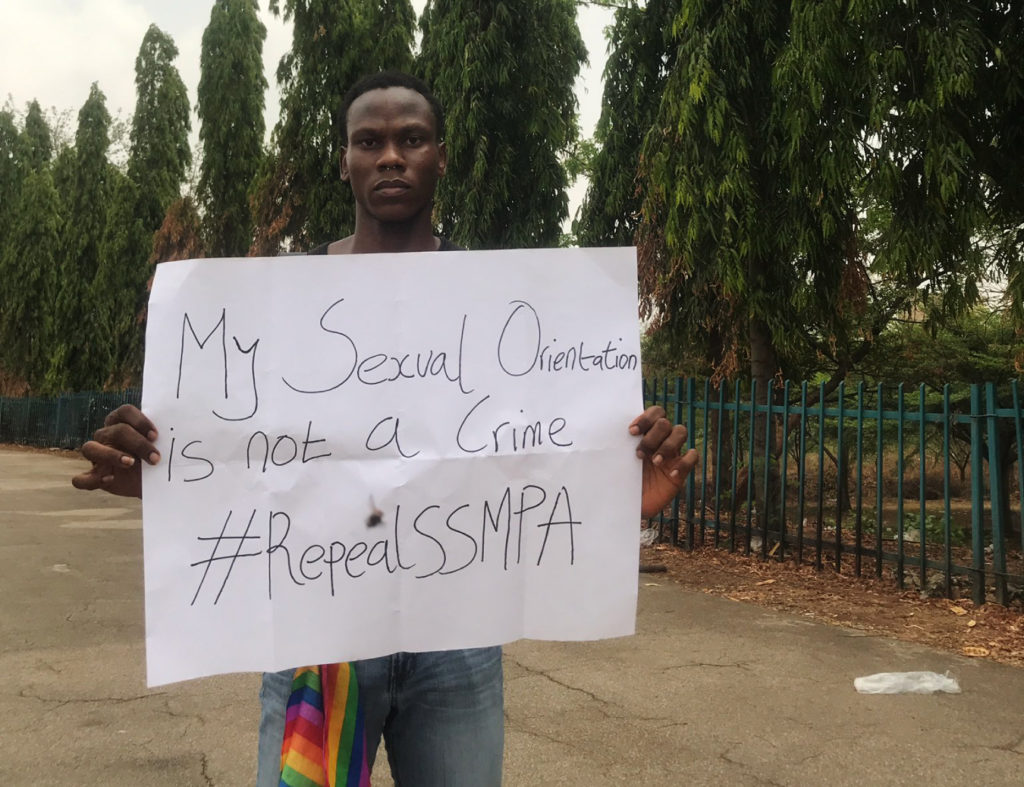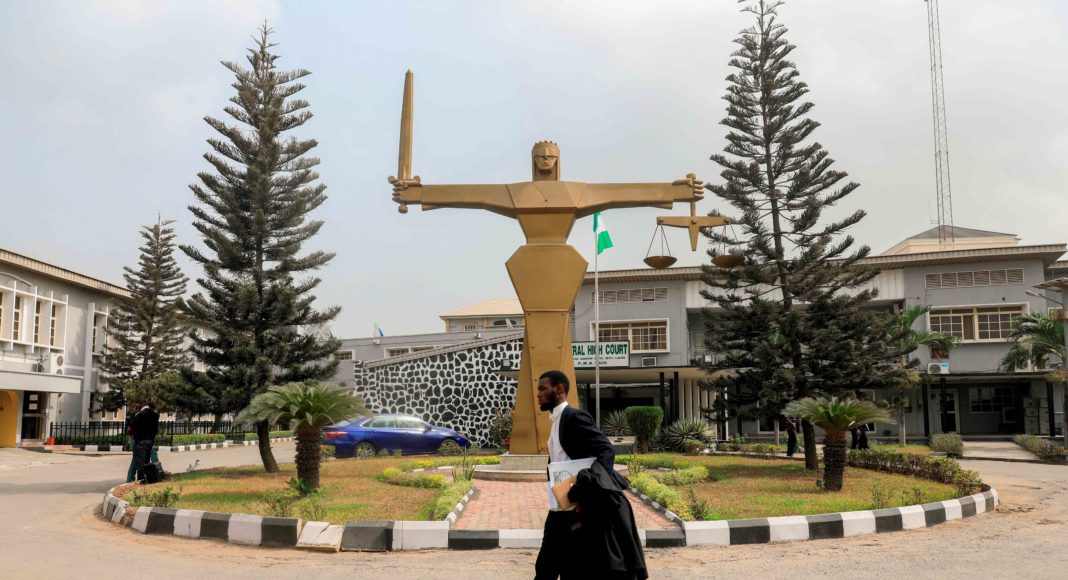By Shade Mary-Ann Olaoye
The hashtag #RepealSSMPA began to trend on Nigerian Twitter and beyond on March 21st, 2021. #RepealSSMPA was a solidarity action in response to Nigerian queer Youtuber VicWonder, who called for the abolishment of laws criminalizing queer people living in Nigeria by going on a hunger strike and protesting at the National House of Assembly in Abuja. Although the protest only lasted two days and ended in unclear circumstances, it focused national and international attention on the Same-Sex Marriage Prohibition Act (SSMPA) and brought forward questions on how to repeal it.
Nigeria is a highly homophobic country that still suffers from the brutal consequences of the SSMPA, which was passed in January 2014 under the leadership of ex-president Goodluck Ebele Jonathan. The SSMPA is a law that criminalizes queer people living in Nigeria and enforces the violation of their fundamental human rights to expression and freedom of association. Under the SSMPA, anyone who makes a “public show of same-sex amorous relationship,” who “registers, operates or participates in gay clubs, societies and organizations,” or who even supports such organizations can be sentenced to a prison term of 14 years.
This law has provided institutional backing to the existing homophobia and violence against queer people within the country and opens them up to all forms of injustice, unfairness, and ill-treatment. According to a report in the Greenwich Social Work Review, violence perpetrated against queer people living in Nigerian rose by 214 percent after the passing of the SSMPA. The law’s passing led to a constant rise of arrests, blackmail, and other forms of attacks against queer Nigerians.
When VicWonder took his protest to the streets, he attracted the attention of several Nigerian homophobic publications, which opened him up to various forms of homophobic slurs and online vitriol. With the hashtag trending both in Nigeria and beyond, the protest also provoked a new conversation concerning the repeal of the SSMPA among queer Nigerians.
As a measure of concern for the community, a few queer Nigerians were worried about his safety and the backlash that his protest would have on the Nigerian gay community.
Teni*, a lesbian, expressed her reservations by saying that she thought the initial aim of the protest was simply to create awareness about the SSMPA, which she thought was a good thing. When she saw that it was a one-man physical protest, she became worried about the queer Nigerian person going on hunger strike at the National Assembly. She stressed understanding that a lot of homophobes who subscribe to the religious, cultural, and societal sentiments that drive homophobia could have harmed him just to prove a point.

Repealing the SSMPA would take an amendment of the constitution. The part that needs amending would be discussed in the National Assembly, then passed by a two-thirds majority. It would then be sent to the states, where the repeal must be passed by at least a two-thirds majority of the House of Assembly before it is presented to the president for assent.
Repealing laws in Nigeria is never simple, and the SSMPA is especially difficult to repeal because it is supported by many homophobic Nigerians and lawmakers, and is used as a weapon to create queer hate for political benefit. Nigeria’s former President, Goodluck Jonathan, used the law to increase his political prospects and secure a second term in the face of a collapsing economy, national insecurity, and mass political corruption. In addition to being used as a political strategy, many Nigerians with power use prejudice against the LGBTQIA+ community to distract and derail the masses from conversations around the many prevailing social ills that exist within the country.
“The SSMPA doesn’t benefit anyone because it can be used to victimize anyone regardless of your sexual orientation or gender identity,” said Victoria*, a 30-year-old lesbian. The law criminalizes anyone in Nigeria who is perceived to be gay due to their gender expression, or even their sense of style.
The #RepealTheSSMPA protest lasted for two days, with no response whatsoever from political leaders. Gay rights advocate Chijioke thought the protest was audacious, but also felt that it was an ill-thought-out move. He said that he does not buy into the idea of gaining the attention of an oppressor by choosing to stay hungry, and prefers to make them hungry. For this, he thinks that a collective effort of the masses, not just queer people, is necessary.
Timinepre, a lawyer, said that in addition to scrapping the SSMPA, concerned citizens should look at provisions in other laws that also criminalize homosexuality and need to be addressed. These laws include sections 214 and 215 of the Criminal Code Act, which applies in southern Nigeria, sections 284 and 405 of the Penal Code, which applies in northern Nigeria, and the Sharia Penal Code, which has been adopted by 12 northern states.
Enitan*, a human rights defender, says that the main ways of fighting the law include efforts that are already underway. She highlighted the need to create awareness that the SSMPA violates the rights of everyone, regardless of sexual orientation and gender identity, and stressed the need to pick apart the provisions in the Act bit by bit. Repealing the SSMPA all at once is likely not to yield any result, she said, so she suggested that individual provisions in the SSMPA should be examined side by side with the constitution of Nigeria.
“The constitution is supreme and any other law is subject to it, including the SSMPA. What part of the SSMPA is against the constitution? How does the SSMPA stand against the constitution of Nigeria, how does the SSMPA stand against the constitution of Nigeria? Take for instance the SSMPA criminalizing the freedom to assemble, whereas the constitution of Nigerian gives us the right to do so,” Enitan explained.
Enitan also said she believed that the pressure from both local and international organizations, and careful, strategic advocacy, with the documentation of the numerous human right violations as a result of the SSMPA, can lead to the steady process of repealing the heinous law.
*Names with an asterisk next to them have changed to protect the identity of the person quoted.

